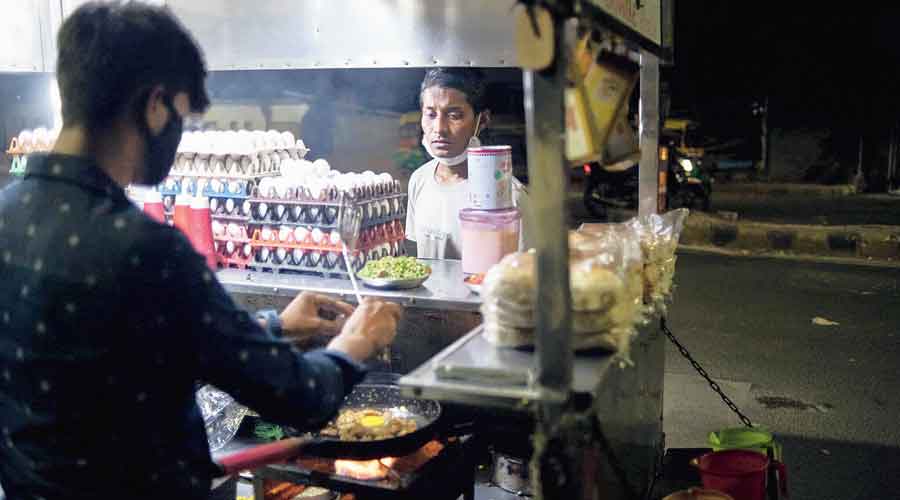The raid came just after sunset. Plainclothes municipal workers swarmed into the busy neighbourhood, seizing contraband. The dealers ran or watched helplessly as the authorities took their illicit goods.
And with that, the government had conducted a successful crackdown on eggs.
Not just the eggs themselves, though city officials had confiscated hundreds of trays of those, too. The authorities grabbed everything — gas canisters, bread, vegetables, plates, glasses, stools — that one might need to run a food cart to sell eggs scrambled, fried or wrapped in a fragrant breading. On the curb, only broken shells remained.
The food-cart operators who got away counted themselves lucky to have escaped.
“We found out that the truck was approaching our location,” said Virendra Ram Chandra Singh, who added that he could prepare eggs 156 ways. “We ran home with our carts, pushing hard and fast.”
The place of the humble egg in the street food culture of Gujarat, where people take their snacks seriously, has become the latest flash point in the growing role of religion in everyday life.
Citing complaints from Hindus as well as health concerns, local officials in Ahmedabad, Gujarat’s largest city, and at least four other cities in mid-November banned the sale and display of meat, fish and eggs on the street.
As the mayor of one city, Rajkot, told the local news media: “Carts with non-vegetarian food can be seen everywhere in the city. The religious sentiments of the people are hurt by this.”
The local authorities weren’t expecting the backlash. In recent days, facing a lawsuit and protests, officials in Ahmedabad relented and allowed sales of previously forbidden food to resume for now, though the dispute is being considered by the courts. They did not respond to requests for comment.
Top leaders in the BJP, which dominates politics in Gujarat, deflected blame to local officials. “Some people eat vegetarian food,” the state’s chief minister, Bhupendra Patel, told local media. “Some people eat non-vegetarian food. The BJP government does not have any problem with it.”
Consumption of eggs in India has grown substantially in recent years as more families have entered the middle class. They now eat 81 per person per year on average. (Americans average more than twice that.)
The central government hopes eggs will become a growing source of protein. Higher egg consumption could help the country’s troubled farm sector. Government forecasters have called for increased chicken and egg consumption, enough to double farmers’ income and prevent child malnutrition.
India’s egg producers have pushed hard to win over a new generation. In a commercial for egg growers, the nutritional impact of eggs settles a dispute between Sunil Gavaskar, Rahul Dravid and Kapil Dev, three legendary Indian cricketers.
The anti-egg campaign amounts to a pushback by conservative Hindus, particularly among the upper caste.
“They want people to believe that vegetarian food is the civilised food,” said Ghanshyam Shah, a retired professor of political sociology living in Ahmedabad.
The ban on eggs certainly had its fans.
Naresh Kansara, an official at a large Hindu temple in Ahmedabad, said that it was wrong to sell non-vegetarian food nearby. “Why don’t they eat at a hotel, away from public view?” he said. “Why so openly?”
Still, the egg ban caused an uproar. The confiscation of carts in November galvanised street vendors, who began protesting outside government offices.
Singh, the Ahmedabad food cart operator who escaped the November crackdown, migrated from poorer Bihar state in the 1990s during a period of economic liberation. Bit by bit, he built a name for himself on the versatility of his eggs.
Singh boasts about the egg dishes his customers love the most. There is the John Paratha, a three-egg omelet topped with bread crumbs to make it crispy and stuffed with mayonnaise, cheese, onion, tomato and coriander salad that is rolled up inside a soft Indian bread. Nargis, a dish named after a famous Bollywood actress from the 1960s, is made of a mince of boiled eggs, softened with cream and served with buns and chapatis. The mahi roll masala is a three-egg omelet with cheese, onions, tomatoes and green chilies.
He set up the cart across from a sprawling public park that attracted families and students. Demand led him to hire four employees.
The president of the street vendors’ association in Gujarat, Rakesh Maheriya, said Hindu vendors and customers were being punished.
Dhara Patel, a 20-year-old engineering student who consumed her favourite dish, minced eggs, a few times a week in the roadside, asked: “Why does the government have a problem if we want to eat eggs?”
New York Times News Service












